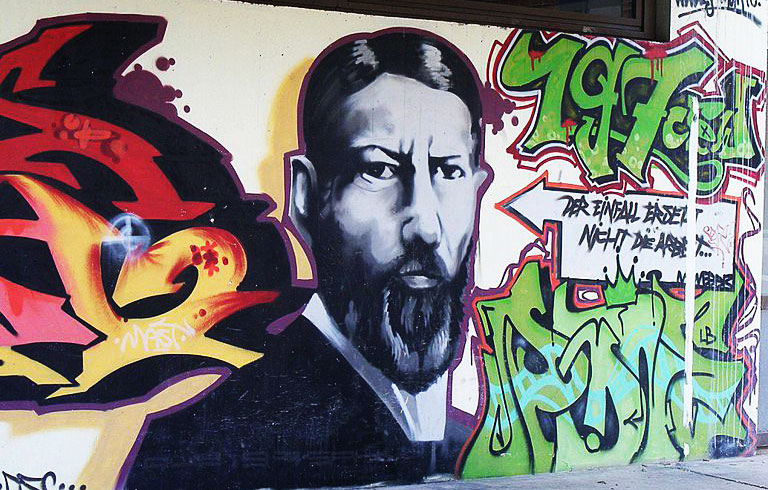
Max Weber gazdaságtörténeti és vallásszociológiai elemzéseiben széles körű áttekintést adott arról a nagy kérdésről, hogy miért éppen a „Nyugat” emelkedett ki a világtörténelem során. Híres hipotézise szerint a protestáns aszkézisben fellelhető gazdasági magatartásokra vezethető vissza, hogy végső soron „a Nyugaton, és csakis a Nyugat talaján” jöhetett létre a „racionális” kultúrán alapuló modern kapitalizmus. Ezzel szemben „Keleten” ennek hiánya tapasztalható: egész történelme során irracionalitás, gazdasági stagnálás és ún. orientális despotizmus uralkodott. Habár írt a konfucianizmusról, illetve a hindu és a zsidó vallásról, addig a kereszténységhez hasonlóan monoteista iszlámról tervezett nagy munkája sosem készülhetett el. A hazai társadalomtudományok azonban nem vettek tudomást Weber protestáns etikára visszavezetett, ideáltipikus kapitalista „szellemének” földrajzi alapjairól, holott ezek a weberi életmű fontos „preszociológiai” előfeltételezéseit képezték. Az előadás célja egyrészt bemutatni Weber hipotézisének földrajzi állításait, másrészt kritika alá vetni globális összehasonlító elemzéseinek eurocentrikus földrajzi képzeletét, és végül felfedni a korabeli geopolitikai, gyarmatbirodalmi viszonyokba ágyazódó társadalomtudományi tudástermelés diskurzív alapjait és ellentmondásait. Weber „progresszív Nyugat” és „merev Kelet” orientalista dichotómiájának dekonstruálása végül kiegészül az iszlámról közölt nézeteinek rövid áttekintésével és néhány politikai gazdasági példával is, rámutatva a gyarmatosításnak és az egyes régiók közötti globális kereskedelem történelmi hegemóniaviszonyainak elfedésére, valamint az orientális despotizmus és a keleti „bezárkózó” gazdaságok eurocentrikus mítoszaira. Az előadás célja ezzel a nemzetközi szakirodalomban jól ismert globális történetírás, valamint a posztkoloniális és dekoloniális megközelítések alapján a „klasszikus” szociológia tudáskánonjának dekolonizált olvasatát sürgetni.
Towards decolonizing “classical” sociology: The geographical critique of Max Weber’s eurocentric world history
In his economic history and sociology of religion, Max Weber presented an expansive account on the big question, why was it the “West” that emerged as dominant in world history. According to his famous hypothesis, ascetic Protestantism was the insufficient ingredient to why “in the West and only on Western soil” could the “rational” culture of modern capitalism evolve. In contrast, the “East” was only home to a range of absences: irrationality, economic stagnation and so-called oriental despotism reigned throughout its whole history. Although Weber had written on Confucianism, the Hindu and Jewish religions, his vast study on Islam, also a monotheism as Christianism, was never to be finished in full. However, Hungarian social sciences and the humanities did not pay any attention to the geographical foundations of Weber’s capitalist “spirit” and its supposed origins in the Protestant ethic, despite these being important “presociological” conceptions of his œuvre. The aim of this paper is first to present the geographical statements of Weber’s hypothesis; second, to criticize the Eurocentric geographical imagination behind his global comparative analysis; and finally, to elucidate the discoursive conditions and antagonisms of social scientific knowledge production embedded in its contemporary geopolitical and imperial-colonial context. The deconstruction of Weber’s orientalist dichotomy of a “progressive West” and “static East” is supplemented by a sketchy overview of his thoughts on Islam and some political economic examples, demonstrating the silences of colonialism and the changing hegemonic relations of interregional global trade, and also the myth of oriental despotism and the “closed” economies of Eastern economies. In sum, the aim with this critique is to provide and argue for a global historical, postcolonial and decolonial reading of the scientific canon of “classical” sociology.
© Zoltán Ginelli
Citation:
Ginelli Z. (2020): A „klasszikus” szociológia dekolonizálása felé: Max Weber eurocentrikus világtörténetének földrajzi kritikája. Kritikai Földrajz Blog, 2019.07.18. Link: /2020/07/18/a-klasszikus-szociologia-dekolonizalasa-fele-max-weber-eurocentrikus-vilagtortenetenek-foldrajzi-kritikaja/